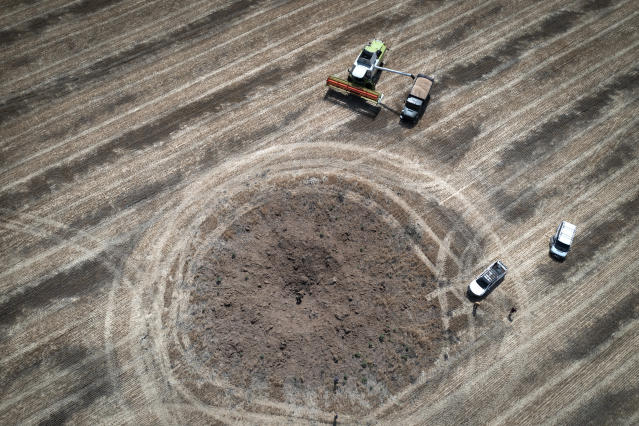Why allowing Ukraine to ship grain during Russia's war matters to the world

Views (86)

Agreements that the United Nations and Turkey brokered with Ukraine and Russia to allow food and fertilizer to get from the warring nations to parts of the world where millions are going hungry have eased concerns over global food security. The Black Sea Grain Initiative has allowed 32.8 million metric tons (36.2 million tons) of food to be exported from Ukraine since last August, more than half to developing countries, including those getting relief from the World Food Program. If the deal isn’t renewed, “you will have a new spike for sure” in food prices, said Maximo Torero, U.N. Food and Agriculture Organization chief economist.
Moscow has ramped up its rhetoric, saying it may not extend the deal that expires Monday unless its demands are met, including ensuring its own agricultural shipments don't face hurdles.
Here's a look at the crucial accord and what it means for the world:
WHAT IS THE GRAIN DEAL?
“One major agricultural producer is waging war on another major agricultural producer, which is affecting the price of food and fertilizers for millions of people around the world,” said Caitlin Welsh, director of the Global Food and Water Security Program at the Center for Strategic and International Studies.
WHAT HAS IT ACCOMPLISHED?
“It is a pretty unique phenomenon to have two warring parties and two intermediaries agree to establish this sort of corridor to get humanitarian products — which is ostensibly what this is — out to markets that need it most,” said John Stawpert, senior manager of environment and trade for the International Chamber of Shipping, which represents 80% of the world’s commercial fleet.
WHAT THREATENS THE DEAL?
Russian President Vladimir Putin said Moscow wouldn’t extend the grain deal unless the West fulfills “the promises given to us.”
“We have repeatedly shown goodwill to extend this deal," Putin told reporters Thursday. "Enough is enough.”
“It’s not uncommon in situations like this for countries to use whatever levers they have to try and get sanctions regimes changed," said Simon Evenett, professor of international trade and economic development at the University of St. Gallen in Switzerland.
Russian “claims that its agriculture sector is suffering are countered by the reality" that production and exports are up since before the war, Welsh said.
Russia exported a record 45.5 million metric tons of wheat in the 2022-2023 trade year, with another all-time high of 47.5 million metric tons expected in 2023-2024, according to U.S. Department of Agriculture estimates.
WHO IS AFFECTED?
“It is critical that the deal is extended for a longer term to create some predictability and stability,” he said in a statement.
Countries that depend on imported food, from Lebanon to Egypt, would need to find suppliers outside the Black Sea region, which would raise costs because they are further away, analysts say.
For low-income countries and people, food “will be less affordable” if the grain deal isn't renewed, World Food Program chief economist Arif Husain told reporters.
WHAT ABOUT UKRAINE?
Ukraine's economy depends on agriculture, and before the war, 75% of its grain exports went through the Black Sea.
Ukraine’s wheat shipments have fallen by more than 40% from its pre-war average, with the USDA expecting 10.5 million metric tons exported in the coming year.
WHAT ELSE AFFECTS FOOD SUPPLY?
There are 45 countries that need food assistance, the Food and Agriculture Organization said in a July report. High domestic food prices are driving hunger in most of those countries, including Haiti, Ukraine, Venezuela and several in Africa and Asia.
While drought can also be a problem for major grain suppliers, analysts see other countries producing enough grain to counterbalance any losses from Ukraine.
Besides Russia's huge exports, Europe and Argentina are increasing wheat shipments, while Brazil saw a banner year for corn.
“These markets adapt and producers adapt — and boy, the wheat and corn markets have adapted very, very quickly,” said Peter Meyer, head of grain analytics at S&P Global Commodity Insights.
___
AP reporter Edith M. Lederer at the United Nations contributed.
___
0 Likes
